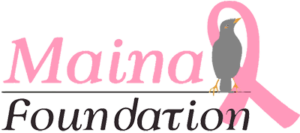
NEWSLETTER
December 2022
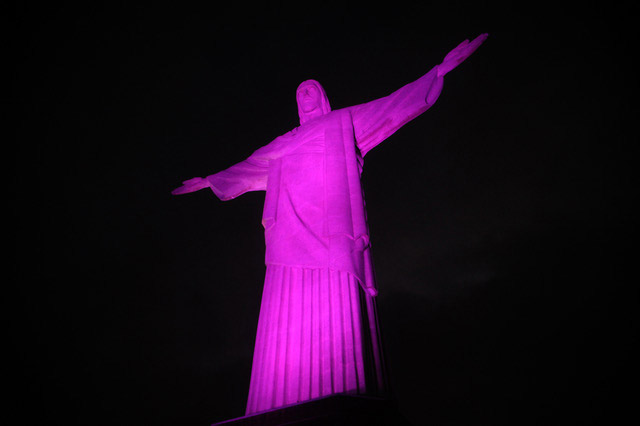
Welcome to the
Maina Foundation Newsletter!
Two weeks ago, I had my annual mammogram, and believe me, it was not fun. Thankfully it was quick, and not too cold, and also potentially lifesaving, so I’m grateful.
This is what it felt like :)))))
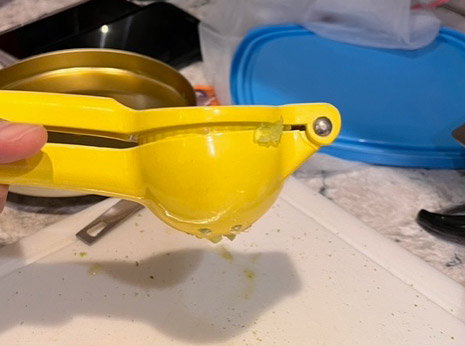
Interview With Cancer Warrior
Dr. Alison Estabrook, MD
By Manju Soni
In this month’s newsletter I’m interviewing a cancer warrior, Dr. Alison Estabrook MD. of the Breast Cancer Care Unit at the Metropilitan Hospital in New York. She has worked in the breast cancer field for close to 40 years and loves taking care of women.
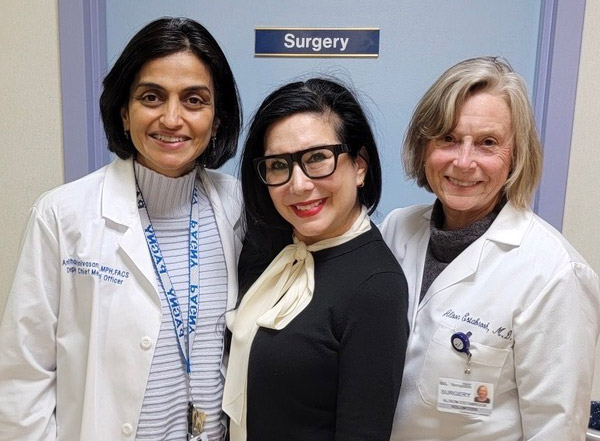
What inspired you to follow this path?
I graduated with a biology degree from Barnard College, did my medical training at New York University, and then my residency in surgery at Columbia Presbyterian Medical Center.
I enjoyed trauma surgery, and at Columbia, I saw a lot of it, sometimes four to five gunshot wounds per night. It was exciting to be a trauma surgeon, but the downside was I rarely saw the patient again, there was not much follow up, other than the recovery from the original trauma.
And, in those days it was difficult to be a woman in other surgical fields, especially cardiovascular or neurosurgery.
Breast surgery seemed a natural choice, I enjoyed it, the men were fine with allowing a woman into the field, and I enjoyed the fact that I had continuity with my patients. It was gratifying to have a patient come back to me and say, “Thank you, I never thought I’d be able to attend my daughter’s wedding,” or “I didn’t expect to be around to see my grandchildren.”
I later moved to St Luke’s-Roosevelt Hospital, which became part of Mount Sinai Hospital. It was an exciting time as genetics was beginning to make traction in the field of breast cancer management. As Chief of Breast Surgery I built a Comprehensive Breast Center at St. Luke’s- Roosevelt in which genetics, psychiatry and complementary medicine were also fully represented.
At that time our main management tool for breast cancer was often a total mastectomy. We then did reconstruction surgery months later. It was a traumatic and disfiguring way of treating the disease. Then, an Italian surgeon, Dr. Umberto Veronesi, showed research that, in women with early breast cancer, removing the lump and applying radiotherapy was as effective as doing a radical mastectomy.
An additional advance at the time was the removal of the sentinel lymph node rather than all axillary lymph nodes. The sentinel lymph node is the first node that drains lymphatic fluid from the breast, thus, in early cancer patients, it’s the most likely to have cancer cells. The idea is to remove it, and a few of the surrounding lymph nodes, instead of radically removing all the axillary lymph nodes. This saves the patient from the excessive swelling of the arm and under arm area. And the pathology is more precise since there are fewer nodes to examine.
These advances in genetics, lumpectomies, and sentinel node removal made breast cancer treatment much more targeted and less disfiguring, thus totally changing the outcome for patients, and the field as well.
What do you do now?
I retired in January 2021, and my plan was to go on breast cancer medical missions abroad. Sadly, the pandemic put an end to that idea. Then I thought I could still do the same work here, in New York City. I approached the Metropolitan Hospital, which is close to where I grew up, and which accepts all patients with or without medical insurance. I used some of my donor money to buy a more modern mammography machine, one that does Tomosynthesis. It uses multiple slices of images to create a 3D picture of the breasts.
One of the most helpful developments of this machine is its biopsy capabilities, which allows the radiologist to do a biopsy there and then.
In the past if a patient presented with a lesion on the mammogram, the radiologist would have to insert a wire with a little hook at the end into it. Then the patient had to be scheduled for the OR where the surgeon would track the wire to find the lesion.
But with modern mammography machines the biopsy can be performed immediately allowing a speedy resolution of the issue.
I also help out by seeing patients. Not so long ago, I encountered a patient, Geralyn Lucas, whom I had operated on 30 years ago, she was 25-years-old at the time her breast cancer was diagnosed. Now, decades later, Geralyn and I have formed a small partnership where she comes to the clinic to talk to the patients undergoing cancer treatment to give them hope and see beyond their immediate pain. We’ve also brought back an exercise program called Moving for Life, and will be starting nutrition classes, and massage therapy for patients undergoing breast cancer treatment.
It’s incredibly moving to see patients’ mental health improve as they are touched when massaged. They feel betrayed by their bodies, that their bodies are a mangled mess with all the treatments they are undergoing. But having the healing touch of massage makes them feel good about their bodies.
Patients look forward to these classes, it gives them something concrete to do, and they also have a lot of camaraderie with fellow patients with whom they can share stories and lighten the burden of cancer.
In January 2023, we will be acquiring a portable ultrasound machine for the Metropolitan Hospital Breast Cancer Unit that can be used to diagnose whether a patient presenting with a breast lump has a cyst or a mass or very dense breast tissue. This will be helpful for both the patients and the clinic.
What are the cutting-edge developments in the breast cancer field that you’re enthusiastic about?
I would say it’s the field of immunotherapy.
In the 1990s, Jim P. Allison, an immunologist and subsequent Nobel Prize winner, identified a protein called CTLA-4 that prevents the body’s immune system from detecting cancer cells. Later, he discovered that inhibiting CTLA-4 would allow the body to fight cancer better. This led to the development and approval of a new class of drugs called “immune checkpoint therapies,” with Ipilimumab (Yervoy) being the first in its class approved in 2011 by the FDA for the treatment of metastatic melanoma.
There’s a heart-warming story of a female patient at the MD Anderson Cancer Center who had widespread metastatic melanoma, who was virtually cured of the disease by Ipilimumab, and who asked to meet Jim Allison. When the two met they both burst into tears.
[As an aside, on the topic of grateful patients, I too have a fun story from my time as an ophthalmologist in South Africa. I was working at one of the busiest government hospitals in Durban then. A colleague of mine operated on a patient with very dense cataracts, and the gentleman was incredibly happy to be able to see again. A week after he was discharged, he returned to the clinic with a gift for my colleague. A cow. In Zulu culture it was customary, especially in those days, to show one’s extreme gratitude with an expensive gift, which, in this case was a cow, who was mooing incessantly in a truck parked right outside the Eye Clinic.]
Do you have any final words for our readers when it comes to breast cancer prevention?
- Have your mammograms done.
- If you have a family history of breast or ovarian cancer have the genetic testing done so you can pick up cancer early and treat it before it’s too advanced.
- Avoid taking hormones after menopause
- Keep your weight down
- Eat healthy
Any fun recommendations?
I’m watching an excellent spy thriller called Slow Horses with Gary Oldman and Kristin Scott Thomas.
I’m listening to a Mount Sinai podcast called Road to Resilience, where Oncologist Gabriel Sara talks about how music helped him survive the war while growing up in Lebabon, why being honest with patients makes them feel respected and dignified, and why it will set them free.
I’m currently reading a lot of Virginia Woolf in preparation for the world premier at the Metropolitan Opera of The Hours by Michael Cunningham, an homage to Mrs Dalloway.
The last book I read before starting this Virginia Woolf adventure was River of Doubt. It’s about Teddy Roosevelt’s trip on a tributary of the Amazon in 1913. It is very interesting both politically and ecologically.
The Night Watchman by Louise Erdrich is a wonderful story about Native Americans.
Thank you Dr. Estabrook for your valuable time and for all that you do for breast cancer patients!
Thank you for reading.
Happy Holidays and blessings and joy for the new year!!!
Manju Soni (she/her) (pen name: M. J. Soni) is a former eye surgeon turned author. She is the author of Defying Apartheid, her debut nonfiction book that captures her experiences of being a young activist against apartheid. Her short fiction and essays has appeared in Ellery Queen Mystery Magazine, Akashic Books, Apeiron Review and The Establishment. She’s a member of Crime Writers of Color and Sisters in Crime (National and Connecticut). https://manjusoni.com | https://twitter.com/MJSoniWrites
NEWS!
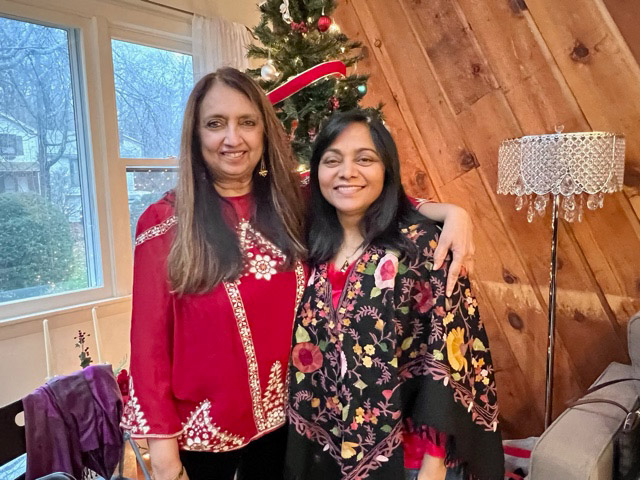
We thank you for your continued support!
For more information on Maina Foundation, and to help its mission, go to https://mainafoundation.org or contact us at 860-434-3985 or info@mainafoundation.org
SAVE A LIFE - DONATE NOW
Donations can also be mailed to:
8 Peppermint Ridge, Old Lyme, CT 06371, USA
